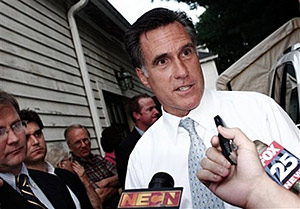 |
 |
 |
 Editorials | Opinions | August 2007 Editorials | Opinions | August 2007  
The Myth of Mitt Romney
 Deroy Murdock - CapitolHillBlue.com Deroy Murdock - CapitolHillBlue.com
go to original


| | Republican presidential hopeful former Massachusetts Gov. Mitt Romney answers reporters questions outside of the Tupelo Music Hall following a town hall meeting, Thursday, Aug. 16, 2007, in Londonderry, N.H. (AP/Robert Spencer) |
His record is not all that it's cracked up to be..

With his confident style and crowd-pleasing smile, Ames, Iowa, straw-poll winner Willard Mitt Romney looks like a formidable contender for the 2008 GOP presidential nomination. If he's lucky, he can leave voters so dazzled that they ignore his record.

Rather than see stars, Andrew Sum and Joseph McLaughlin of the Center for Labor Market Studies at Boston's Northeastern University placed Romney's rule as Massachusetts governor beneath their statistical microscope. Let's hope what they discovered is not contagious.

"Our analysis reveals a weak comparative economic performance of the state over the Romney years, one of the worst in the country," the researchers wrote in the July 29 Boston Globe. Specifically, they found:

• As U.S. real output grew 13 percent between 2002 and 2006, Massachusetts trailed at 9 percent.

• Manufacturing employment fell 7 percent nationwide those years, but sank 14 percent under Romney, placing Massachusetts 48th among the states.

• Between fall 2003 and last autumn, U.S. job growth averaged 5.4 percent, nearly thrice Massachusetts' anemic 1.9 percent pace.

Romney predicted Aug. 12 on "Fox News Sunday" that Massachusetts eventually will harvest his new-business-development seeds. "You're going to see the product of that generate great results for years to come."

Romney's vaunted health-care plan also disappoints. It forces individuals to purchase medical coverage and fines those who refuse. Businesses with at least 11 employees either must offer health insurance or pay penalties.

(Democrats overrode Romney's veto of this provision.) The Commonwealth Health Insurance Connector, a government panel, defines every health policy's "Minimum Creditable Coverage." So far, the Pacific Research Institute's Sally Pipes reports, monthly premiums average $380, not $200, as Romney forecast. The program may cost taxpayers an extra $276.4 million this year, more than double its original $125.4 million estimated expense.

Romney blames tinkering Democratic state legislators.

"I don't know what's going to happen down the road as the Democrats get their hands on it," Romney told the National Review Institute. "I was a little concerned at the signing ceremony when Ted Kennedy showed up."

Romney's Pontius-Pilate-like hand-washing is thoroughly unconvincing. Bay State Democrats would have struggled to hijack health reform based on tax incentives, choice and ownership -- as GOP front-runner and former New York City Mayor Rudolph Giuliani recently proposed -- rather than RomneyCare's easily scaled universal mandates, regulatory boards and government-imposed standards. (Romney's campaign did not return calls for comment.)

Romney's administration fades badly beside Giuliani's accomplishments.

• While Romney couldn't persuade Democratic legislators to lower taxes, Giuliani convinced a Democratic City Council to reduce or scrap 23 taxes.

Consequently, Gotham's top income-tax rate fell 20.6 percent, while Massachusetts' remains stuck at 5.3 percent, despite Romney's unheeded plea to cut it to 5 percent.

• Though Romney's tax burden (revenue's proportion of personal income) increased 10.8 percent, Giuliani sliced his 17 percent.

• Public-assistance rolls slid 5 percent under Romney (albeit, after most reductions already occurred), but they tumbled 58 percent under Giuliani, starting before President Bill Clinton signed federal welfare reform.

• Romney watched unemployment wane 5.7 percent while joblessness plummeted 40.8 percent under Giuliani.

• Personal income advanced 18.2 percent during Romney's days, while it sped ahead 49.9 percent during Giuliani's time.

It's tricky to contrast Romney and Giuliani. The former mayor led a city of 8 million (up 9.3 percent during his mayoralty), and supervised 215,891 public employees (down 3.1 percent from his arrival, or 17.2 percent, excluding new cops and teachers). Though not a governor, Giuliani governed a metropolis one-quarter larger in population than Massachusetts. Its 43,979 state employees (down 1.4 percent under Romney) served 6.4 million residents (up 0.1 percent).

It would be easier to draw parallels if, like Giuliani, Romney had won re-election, rather than duck a second-term bid that experts widely predicted he would lose. Romney explained to the Globe that he stood aside because, "There was very little that had to spill into a second term that we had any prospects of ever getting done."

So, what remains to recommend Romney? No doubt, he showed how to succeed in business by founding Bain Capital, which flourishes. Also, Romney is smooth, charismatic and handsome. Someday, he could portray George Clooney's older brother in "Ocean's 14." But, given his flimsy gubernatorial legacy, that doesn't mean much. In essence, Mitt Romney is just another pretty face.

New York commentator Deroy Murdock is a columnist and a media fellow with the Hoover Institution on War, Revolution and Peace at Stanford University. E-mail him at deroy.murdock(at)gmail.com. | 
 | |
 |



